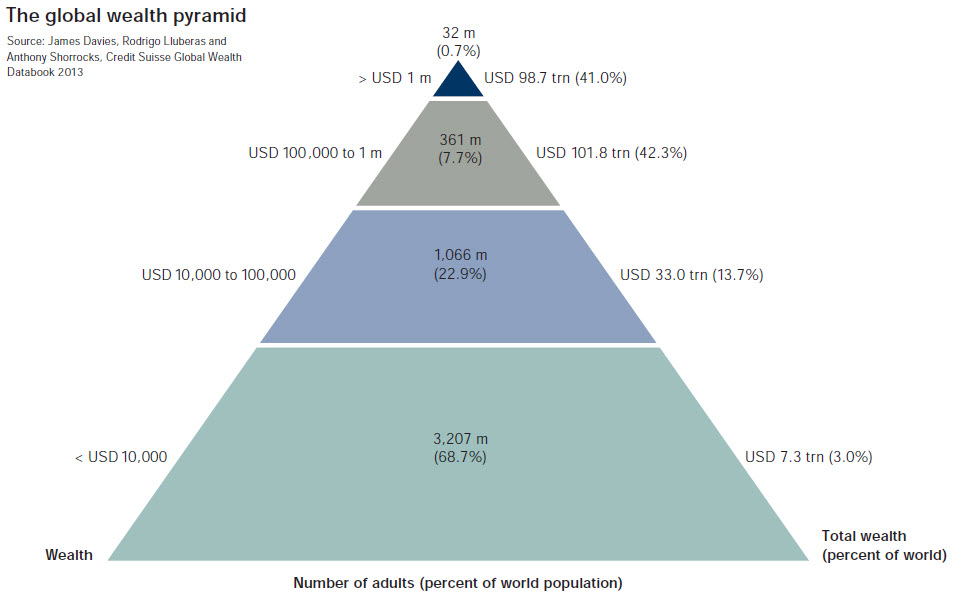– Meanwhile In The Real World, Americans Sell Hair, Breast Milk And Eggs To Make Ends Meet (ZeroHedge, Oct 15, 2013):
With a stunning 41% of global wealth in the hands of a mere 0.7% of the world’s population, the lower- and middle-class continue to fight amongst themselves for the scraps to maintain a decent standard of living. In the US, with the home-equity ATM now closed (and maybe EBT interrupted), those struggling to make ends meet are turning to the only “asset” they have left that is unencumbered (for now) – their body parts.As Bloomberg reports, since the beginning of 2011, ‘hair,’ ‘eggs,’ or ‘kidney’ have been among the top four autofill results for the Google search query, ‘I want to sell my…;’ and “the fact that people even explore it indicates that there are still a lot of people worried about their financial outlook,” as hair, breast milk and eggs are doubling as ATMs for more and more cash-strapped Americans.
As one analyst noted,
“This is very much unlike every other recovery that we’ve had. It’s going to be a slow-grinding, very frustrating recovery.”
Which should come as no surprise given the massive wealth inequalities…
Personal wealth varies across adults for many reasons.
Some individuals with little wealth may be at early stages in their careers, with little chance or motivation to accumulate assets. Others may have suffered business setbacks or personal misfortunes, or live in parts of the world where opportunities for wealth creation are severely limited.
At the other end of the spectrum, there are individuals who have acquired a large fortune through a combination of talent, hard work or simply being in the right place at the right time.
The wealth pyramid above captures these differences in striking detail. It has a large base of low wealth holders, alongside upper tiers occupied by progressively fewer people.
Via Bloomberg,
Hair, breast milk and eggs are doubling as automated teller machines for some cash-strapped Americans such as April Hare.
…
“I was just trying to find ways to make money, and I remembered Jo from ‘Little Women,’ and she sold her hair,” the 35-year-old from Atlanta said. “I’ve always had lots of hair, but this is the first time I’ve actually had the idea to sell it because I’m in a really tight jam right now.”
The mother of two posted pictures of her 18-inch auburn mane on www.buyandsellhair.com, asking at least $1,000 and receiving responses within hours. Hare, who also considered selling her breast milk, joins others exploring unconventional ways to make ends meet as the four-year-old economic expansion struggles to invigorate the labor market and stimulate incomes.
In all but two quarters since the beginning of 2011, “hair,” “eggs,” or “kidney” have been among the top four autofill results for the Google search query, “I want to sell my…,” …
While Americans can legally sell hair, breast milk and eggs, the sale and purchase of a kidney in the U.S. is against the law. …
“If you’ve been unemployed for years, if you’re on food stamps and you’ve had trouble getting by, I can totally see you being very economically desperate,” Colas said. “I don’t think a lot of people sell their kidneys. I do think a lot of people in desperation do that search to say, ‘If worse comes to worst what could I do?’”
…
The average donor is about 27 years old, and 78 percent have a college degree or are pursuing one, Williams said. More than half of donor applications come through an online resource.
The Internet is probably responsible for much of the increased interest in cashing in on body parts, Becker said. Online search engines and exchanges make communications between “buyers and sellers of things like organs or hair much easier,” he said.
Perhaps the last paragraph sums up the US citizenry’s perspective better than any other:
“I’ve been growing my hair out for maybe a little over two years, and I just decided now was the time since I lost my job,” MacDonald said. “It doesn’t cost anything to grow your hair out and sell it for money. It’s basically profit with very little work. Anything you can do, I’m sure people are willing to do it.”
